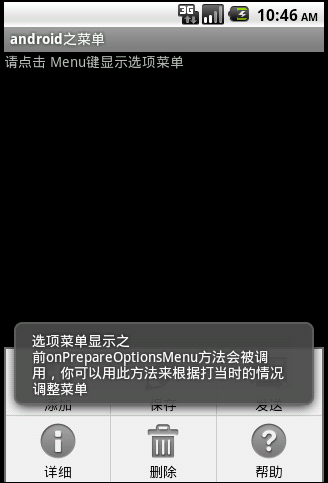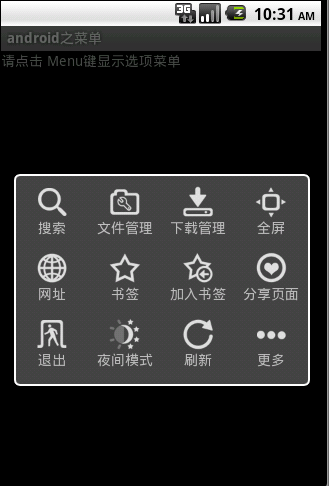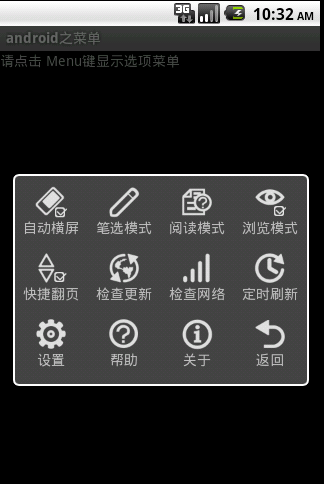菜单是用户界面中最常见的元素之一,使用非常频繁,在Android中,菜单被分为如下三种,选项菜单(OptionsMenu)、上下文菜单(ContextMenu)和子菜单(SubMenu),今天这讲是OptionsMenu
一、概述
public boolean onCreateOptionsMenu(Menu menu):使用此方法调用OptionsMenu 。
public boolean onOptionsItemSelected(MenuItem item):选中菜单项后发生的动作。
public void onOptionsMenuClosed(Menu menu):菜单关闭后发生的动作。
public boolean onPrepareOptionsMenu(Menu menu):选项菜单显示之前onPrepareOptionsMenu方法会被调用,你可以用此方法来根据打当时的情况调整菜单。
public boolean onMenuOpened(int featureId, Menu menu):单打开后发生的动作。
二、默认样式
默认样式是在屏幕底部弹出一个菜单,这个菜单我们就叫他选项菜单OptionsMenu,一般情况下,选项菜单最多显示2排每排3个菜单项,这些菜单项有文字有图标,也被称作Icon Menus,如果多于6项,从第六项开始会被隐藏,在第六项会出现一个More里,点击More才出现第六项以及以后的菜单项,这些菜单项也被称作Expanded Menus。下面介绍。
 1.main.xml
1.main.xml
<?xml version="1.0" encoding="utf-8"?>
<LinearLayout xmlns:android="http://schemas.android.com/apk/res/android"
android:orientation="vertical" android:layout_width="fill_parent"
android:layout_height="fill_parent" >
<TextView android:layout_width="wrap_content"
android:layout_height="wrap_content" android:text="请点击 Menu键显示选项菜单"
android:id="@+id/TextView02" />
</LinearLayout>
2。重载onCreateOptionsMenu(Menu menu)方法
重载onCreateOptionsMenu(Menu menu)方法,并在此方法中添加菜单项,最后返回true,如果false,菜单则不会显示。
 public boolean onCreateOptionsMenu(Menu menu)
public boolean onCreateOptionsMenu(Menu menu)
@Override
public boolean onCreateOptionsMenu(Menu menu) {
/*
*
* add()方法的四个参数,依次是:
*
* 1、组别,如果不分组的话就写Menu.NONE,
*
* 2、Id,这个很重要,Android根据这个Id来确定不同的菜单
*
* 3、顺序,那个菜单现在在前面由这个参数的大小决定
*
* 4、文本,菜单的显示文本
*/
menu.add(Menu.NONE, Menu.FIRST + 1, 5, "删除").setIcon(
android.R.drawable.ic_menu_delete);
// setIcon()方法为菜单设置图标,这里使用的是系统自带的图标,同学们留意一下,以
// android.R开头的资源是系统提供的,我们自己提供的资源是以R开头的
menu.add(Menu.NONE, Menu.FIRST + 2, 2, "保存").setIcon(
android.R.drawable.ic_menu_edit);
menu.add(Menu.NONE, Menu.FIRST + 3, 6, "帮助").setIcon(
android.R.drawable.ic_menu_help);
menu.add(Menu.NONE, Menu.FIRST + 4, 1, "添加").setIcon(
android.R.drawable.ic_menu_add);
menu.add(Menu.NONE, Menu.FIRST + 5, 4, "详细").setIcon(
android.R.drawable.ic_menu_info_details);
menu.add(Menu.NONE, Menu.FIRST + 6, 3, "发送").setIcon(
android.R.drawable.ic_menu_send);
return true;
}
3。为菜单项注册事件
使用onOptionsItemSelected(MenuItem item)方法为菜单项注册事件
 public boolean onOptionsItemSelected(MenuItem item)
public boolean onOptionsItemSelected(MenuItem item)
@Override
public boolean onOptionsItemSelected(MenuItem item) {
switch (item.getItemId()) {
case Menu.FIRST + 1:
Toast.makeText(this, "删除菜单被点击了", Toast.LENGTH_LONG).show();
break;
case Menu.FIRST + 2:
Toast.makeText(this, "保存菜单被点击了", Toast.LENGTH_LONG).show();
break;
case Menu.FIRST + 3:
Toast.makeText(this, "帮助菜单被点击了", Toast.LENGTH_LONG).show();
break;
case Menu.FIRST + 4:
Toast.makeText(this, "添加菜单被点击了", Toast.LENGTH_LONG).show();
break;
case Menu.FIRST + 5:
Toast.makeText(this, "详细菜单被点击了", Toast.LENGTH_LONG).show();
break;
case Menu.FIRST + 6:
Toast.makeText(this, "发送菜单被点击了", Toast.LENGTH_LONG).show();
break;
}
return false;
}
4。其他按需要重载
完整代码
 DefaultMenu
DefaultMenu
package com.wjq.menu;
import android.app.Activity;
import android.os.Bundle;
import android.view.Menu;
import android.view.MenuItem;
import android.widget.Toast;
public class DefaultMenu extends Activity {
/** Called when the activity is first created. */
@Override
public void onCreate(Bundle savedInstanceState) {
super.onCreate(savedInstanceState);
setContentView(R.layout.main);
}
@Override
public boolean onCreateOptionsMenu(Menu menu) {
/*
*
* add()方法的四个参数,依次是:
*
* 1、组别,如果不分组的话就写Menu.NONE,
*
* 2、Id,这个很重要,Android根据这个Id来确定不同的菜单
*
* 3、顺序,那个菜单现在在前面由这个参数的大小决定
*
* 4、文本,菜单的显示文本
*/
menu.add(Menu.NONE, Menu.FIRST + 1, 5, "删除").setIcon(
android.R.drawable.ic_menu_delete);
// setIcon()方法为菜单设置图标,这里使用的是系统自带的图标,同学们留意一下,以
// android.R开头的资源是系统提供的,我们自己提供的资源是以R开头的
menu.add(Menu.NONE, Menu.FIRST + 2, 2, "保存").setIcon(
android.R.drawable.ic_menu_edit);
menu.add(Menu.NONE, Menu.FIRST + 3, 6, "帮助").setIcon(
android.R.drawable.ic_menu_help);
menu.add(Menu.NONE, Menu.FIRST + 4, 1, "添加").setIcon(
android.R.drawable.ic_menu_add);
menu.add(Menu.NONE, Menu.FIRST + 5, 4, "详细").setIcon(
android.R.drawable.ic_menu_info_details);
menu.add(Menu.NONE, Menu.FIRST + 6, 3, "发送").setIcon(
android.R.drawable.ic_menu_send);
return true;
}
@Override
public boolean onOptionsItemSelected(MenuItem item) {
switch (item.getItemId()) {
case Menu.FIRST + 1:
Toast.makeText(this, "删除菜单被点击了", Toast.LENGTH_LONG).show();
break;
case Menu.FIRST + 2:
Toast.makeText(this, "保存菜单被点击了", Toast.LENGTH_LONG).show();
break;
case Menu.FIRST + 3:
Toast.makeText(this, "帮助菜单被点击了", Toast.LENGTH_LONG).show();
break;
case Menu.FIRST + 4:
Toast.makeText(this, "添加菜单被点击了", Toast.LENGTH_LONG).show();
break;
case Menu.FIRST + 5:
Toast.makeText(this, "详细菜单被点击了", Toast.LENGTH_LONG).show();
break;
case Menu.FIRST + 6:
Toast.makeText(this, "发送菜单被点击了", Toast.LENGTH_LONG).show();
break;
}
return false;
}
@Override
public void onOptionsMenuClosed(Menu menu) {
Toast.makeText(this, "选项菜单关闭了", Toast.LENGTH_LONG).show();
}
@Override
public boolean onPrepareOptionsMenu(Menu menu) {
Toast.makeText(this,
"选项菜单显示之前onPrepareOptionsMenu方法会被调用,你可以用此方法来根据打当时的情况调整菜单",
Toast.LENGTH_LONG).show();
// 如果返回false,此方法就把用户点击menu的动作给消费了,onCreateOptionsMenu方法将不会被调用
return true;
}
}
5.效果浏览

三、自定义样式
 1.gridview_menu.xml
1.gridview_menu.xml
<?xml version="1.0" encoding="utf-8"?>
<LinearLayout xmlns:android="http://schemas.android.com/apk/res/android"
android:orientation="vertical"
android:layout_width="fill_parent"
android:layout_height="fill_parent"
>
<GridView
android:id="@+id/gridview"
android:layout_width="fill_parent"
android:layout_height="fill_parent"
android:numColumns="4"
android:verticalSpacing="10dip"
android:horizontalSpacing="10dip"
android:stretchMode="columnWidth"
android:gravity="center"
/>
</LinearLayout>
首先自定义菜单界面,我是GridView来包含菜单项,4列3行
 2.item_menu.xml
2.item_menu.xml
<?xml version="1.0" encoding="utf-8"?>
<RelativeLayout xmlns:android="http://schemas.android.com/apk/res/android"
android:id="@+id/RelativeLayout_Item"
android:layout_width="fill_parent" android:layout_height="wrap_content"
android:paddingBottom="5dip">
<ImageView android:id="@+id/item_image"
android:layout_centerHorizontal="true" android:layout_width="wrap_content"
android:layout_height="wrap_content"></ImageView>
<TextView android:layout_below="@id/item_image" android:id="@+id/item_text"
android:layout_centerHorizontal="true" android:layout_width="wrap_content"
android:layout_height="wrap_content" android:text="选项"></TextView>
</RelativeLayout>
菜单项的现实样式,一个图标和一个文字。
3.定义
 代码
代码
private boolean isMore = false;// menu菜单翻页控制
AlertDialog menuDialog;// menu菜单Dialog
GridView menuGrid;
View menuView;
private final int ITEM_SEARCH = 0;// 搜索
private final int ITEM_FILE_MANAGER = 1;// 文件管理
private final int ITEM_DOWN_MANAGER = 2;// 下载管理
private final int ITEM_FULLSCREEN = 3;// 全屏
private final int ITEM_MORE = 11;// 菜单
/** 菜单图片 **/
int[] menu_image_array = { R.drawable.menu_search,
R.drawable.menu_filemanager, R.drawable.menu_downmanager,
R.drawable.menu_fullscreen, R.drawable.menu_inputurl,
R.drawable.menu_bookmark, R.drawable.menu_bookmark_sync_import,
R.drawable.menu_sharepage, R.drawable.menu_quit,
R.drawable.menu_nightmode, R.drawable.menu_refresh,
R.drawable.menu_more };
/** 菜单文字 **/
String[] menu_name_array = { "搜索", "文件管理", "下载管理", "全屏", "网址", "书签",
"加入书签", "分享页面", "退出", "夜间模式", "刷新", "更多" };
/** 菜单图片2 **/
int[] menu_image_array2 = { R.drawable.menu_auto_landscape,
R.drawable.menu_penselectmodel, R.drawable.menu_page_attr,
R.drawable.menu_novel_mode, R.drawable.menu_page_updown,
R.drawable.menu_checkupdate, R.drawable.menu_checknet,
R.drawable.menu_refreshtimer, R.drawable.menu_syssettings,
R.drawable.menu_help, R.drawable.menu_about, R.drawable.menu_return };
/** 菜单文字2 **/
String[] menu_name_array2 = { "自动横屏", "笔选模式", "阅读模式", "浏览模式", "快捷翻页",
"检查更新", "检查网络", "定时刷新", "设置", "帮助", "关于", "返回" };
 4.public boolean onMenuOpened(int featureId, Menu menu)
4.public boolean onMenuOpened(int featureId, Menu menu)
@Override
public boolean onMenuOpened(int featureId, Menu menu) {
if (menuDialog == null) {
menuDialog = new AlertDialog.Builder(this).setView(menuView).show();
} else {
menuDialog.show();
}
return false;// 返回为true 则显示系统menu
}
如果第一次打开则设置视图,否则直接显示menuDialog视图。
 5.private SimpleAdapter getMenuAdapter(String[] menuNameArray,
5.private SimpleAdapter getMenuAdapter(String[] menuNameArray,
private SimpleAdapter getMenuAdapter(String[] menuNameArray,
int[] imageResourceArray) {
ArrayList<HashMap<String, Object>> data = new ArrayList<HashMap<String, Object>>();
for (int i = 0; i < menuNameArray.length; i++) {
HashMap<String, Object> map = new HashMap<String, Object>();
map.put("itemImage", imageResourceArray[i]);
map.put("itemText", menuNameArray[i]);
data.add(map);
}
SimpleAdapter simperAdapter = new SimpleAdapter(this, data,
R.layout.item_menu, new String[] { "itemImage", "itemText" },
new int[] { R.id.item_image, R.id.item_text });
return simperAdapter;
}
为菜单添加菜单项。
 6.public boolean onCreateOptionsMenu(Menu menu)
6.public boolean onCreateOptionsMenu(Menu menu)
@Override
public boolean onCreateOptionsMenu(Menu menu) {
menu.add("menu");// 必须创建一项
return super.onCreateOptionsMenu(menu);
}
 7.protected void onCreate(Bundle savedInstanceState)
7.protected void onCreate(Bundle savedInstanceState)
@Override
protected void onCreate(Bundle savedInstanceState) {
// TODO Auto-generated method stub
super.onCreate(savedInstanceState);
setContentView(R.layout.main);
menuView = View.inflate(this, R.layout.gridview_menu, null);
// 创建AlertDialog
menuDialog = new AlertDialog.Builder(this).create();
menuDialog.setView(menuView);
menuDialog.setOnKeyListener(new OnKeyListener() {
public boolean onKey(DialogInterface dialog, int keyCode,
KeyEvent event) {
if (keyCode == KeyEvent.KEYCODE_MENU)// 监听按键
dialog.dismiss();
return false;
}
});
menuGrid = (GridView) menuView.findViewById(R.id.gridview);
menuGrid.setAdapter(getMenuAdapter(menu_name_array, menu_image_array));
/** 监听menu选项 **/
menuGrid.setOnItemClickListener(new OnItemClickListener() {
public void onItemClick(AdapterView<?> arg0, View arg1, int arg2,
long arg3) {
switch (arg2) {
case ITEM_SEARCH:// 搜索
break;
case ITEM_FILE_MANAGER:// 文件管理
break;
case ITEM_DOWN_MANAGER:// 下载管理
break;
case ITEM_FULLSCREEN:// 全屏
break;
case ITEM_MORE:// 翻页
if (isMore) {
menuGrid.setAdapter(getMenuAdapter(menu_name_array2,
menu_image_array2));
isMore = false;
} else {// 首页
menuGrid.setAdapter(getMenuAdapter(menu_name_array,
menu_image_array));
isMore = true;
}
menuGrid.invalidate();// 更新menu
menuGrid.setSelection(ITEM_MORE);
break;
}
}
});
}
 完整代码
完整代码
package com.wjq.menu;
import java.util.ArrayList;
import java.util.HashMap;
import android.app.Activity;
import android.app.AlertDialog;
import android.content.DialogInterface;
import android.content.DialogInterface.OnKeyListener;
import android.os.Bundle;
import android.view.KeyEvent;
import android.view.Menu;
import android.view.View;
import android.widget.AdapterView;
import android.widget.GridView;
import android.widget.SimpleAdapter;
import android.widget.AdapterView.OnItemClickListener;
public class CustomizeMenu extends Activity {
private boolean isMore = false;// menu菜单翻页控制
AlertDialog menuDialog;// menu菜单Dialog
GridView menuGrid;
View menuView;
private final int ITEM_SEARCH = 0;// 搜索
private final int ITEM_FILE_MANAGER = 1;// 文件管理
private final int ITEM_DOWN_MANAGER = 2;// 下载管理
private final int ITEM_FULLSCREEN = 3;// 全屏
private final int ITEM_MORE = 11;// 菜单
/** 菜单图片 **/
int[] menu_image_array = { R.drawable.menu_search,
R.drawable.menu_filemanager, R.drawable.menu_downmanager,
R.drawable.menu_fullscreen, R.drawable.menu_inputurl,
R.drawable.menu_bookmark, R.drawable.menu_bookmark_sync_import,
R.drawable.menu_sharepage, R.drawable.menu_quit,
R.drawable.menu_nightmode, R.drawable.menu_refresh,
R.drawable.menu_more };
/** 菜单文字 **/
String[] menu_name_array = { "搜索", "文件管理", "下载管理", "全屏", "网址", "书签",
"加入书签", "分享页面", "退出", "夜间模式", "刷新", "更多" };
/** 菜单图片2 **/
int[] menu_image_array2 = { R.drawable.menu_auto_landscape,
R.drawable.menu_penselectmodel, R.drawable.menu_page_attr,
R.drawable.menu_novel_mode, R.drawable.menu_page_updown,
R.drawable.menu_checkupdate, R.drawable.menu_checknet,
R.drawable.menu_refreshtimer, R.drawable.menu_syssettings,
R.drawable.menu_help, R.drawable.menu_about, R.drawable.menu_return };
/** 菜单文字2 **/
String[] menu_name_array2 = { "自动横屏", "笔选模式", "阅读模式", "浏览模式", "快捷翻页",
"检查更新", "检查网络", "定时刷新", "设置", "帮助", "关于", "返回" };
@Override
protected void onCreate(Bundle savedInstanceState) {
// TODO Auto-generated method stub
super.onCreate(savedInstanceState);
setContentView(R.layout.main);
menuView = View.inflate(this, R.layout.gridview_menu, null);
// 创建AlertDialog
menuDialog = new AlertDialog.Builder(this).create();
menuDialog.setView(menuView);
menuDialog.setOnKeyListener(new OnKeyListener() {
public boolean onKey(DialogInterface dialog, int keyCode,
KeyEvent event) {
if (keyCode == KeyEvent.KEYCODE_MENU)// 监听按键
dialog.dismiss();
return false;
}
});
menuGrid = (GridView) menuView.findViewById(R.id.gridview);
menuGrid.setAdapter(getMenuAdapter(menu_name_array, menu_image_array));
/** 监听menu选项 **/
menuGrid.setOnItemClickListener(new OnItemClickListener() {
public void onItemClick(AdapterView<?> arg0, View arg1, int arg2,
long arg3) {
switch (arg2) {
case ITEM_SEARCH:// 搜索
break;
case ITEM_FILE_MANAGER:// 文件管理
break;
case ITEM_DOWN_MANAGER:// 下载管理
break;
case ITEM_FULLSCREEN:// 全屏
break;
case ITEM_MORE:// 翻页
if (isMore) {
menuGrid.setAdapter(getMenuAdapter(menu_name_array2,
menu_image_array2));
isMore = false;
} else {// 首页
menuGrid.setAdapter(getMenuAdapter(menu_name_array,
menu_image_array));
isMore = true;
}
menuGrid.invalidate();// 更新menu
menuGrid.setSelection(ITEM_MORE);
break;
}
}
});
}
@Override
public boolean onCreateOptionsMenu(Menu menu) {
menu.add("menu");// 必须创建一项
return super.onCreateOptionsMenu(menu);
}
private SimpleAdapter getMenuAdapter(String[] menuNameArray,
int[] imageResourceArray) {
ArrayList<HashMap<String, Object>> data = new ArrayList<HashMap<String, Object>>();
for (int i = 0; i < menuNameArray.length; i++) {
HashMap<String, Object> map = new HashMap<String, Object>();
map.put("itemImage", imageResourceArray[i]);
map.put("itemText", menuNameArray[i]);
data.add(map);
}
SimpleAdapter simperAdapter = new SimpleAdapter(this, data,
R.layout.item_menu, new String[] { "itemImage", "itemText" },
new int[] { R.id.item_image, R.id.item_text });
return simperAdapter;
}
@Override
public boolean onMenuOpened(int featureId, Menu menu) {
if (menuDialog == null) {
menuDialog = new AlertDialog.Builder(this).setView(menuView).show();
} else {
menuDialog.show();
}
return false;// 返回为true 则显示系统menu
}
}
原代码下载点击这里
效果浏览




发表评论 取消回复